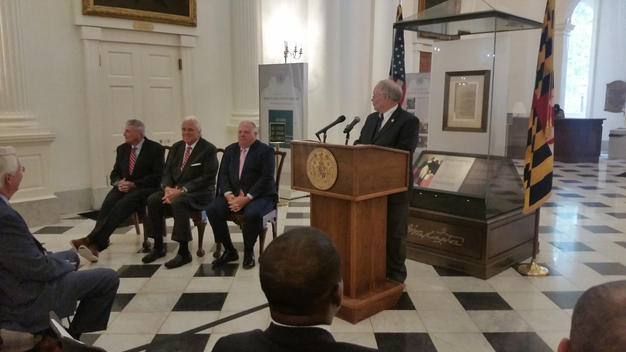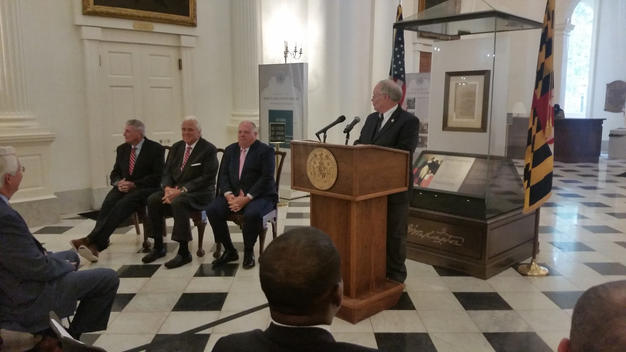Leaders Hail Deal Stabilizing Md. Health Insurance Market — But Dems Want More

While Gov. Lawrence J. Hogan Jr. (R) and legislative leaders on Wednesday hailed federal approval of a plan to stabilize Maryland’s health insurance markets, some Democratic lawmakers and health care advocates said they will continue to press for a more expansive and permanent fix. Del. Joseline Pena-Melnyk (D-Prince George’s), the incoming vice chairwoman of the House Health and Government Operations Committee, told Maryland Matters Wednesday that she plans to reintroduce legislation to create a health care “down-payment” – a measure mandating that healthy people buy insurance in Maryland. “This is wonderful and I’m very proud of our work,” Pena-Melnyk said of the state’s new deal with the federal government that would create a state reinsurance market to minimize increases in health insurance rates for a five-year period. “This will give great relief to thousands and thousands of consumers. But we know we have to find a permanent solution.”  Health Secretary Robert R. Neall introduces (left to right) House Speaker Michael E. Busch, Senate President Thomas V. Mike Miller Jr. and Gov. Lawrence J. Hogan Jr. during a State House news conference Wednesday. Photo by Josh Kurtz Officially, the federal Centers for Medicare and Medicaid has provided the state a waiver from certain Affordable Care Act rules, enabling the state to establish a reinsurance pool that will provide funding for catastrophic claims for policyholders in the individual insurance market. State officials say this will allow private insurers to offer consumers dramatically lower rates than originally anticipated. Increases this year were expected to be in the 50 percent range. The state’s waiver is the product of bipartisan negotiations and legislation from this year’s General Assembly session between Hogan and his top advisers and legislative leaders. They were precipitated by the new federal tax law from President Trump and the Republican Congress, which eliminated the mandate to purchase insurance from the ACA, more commonly known as Obamacare. Without mandates requiring healthy individuals to buy insurance, analysts fear that insurance pools won’t have enough money to provide coverage to poor, indigent and sick people. There has been a protracted and high-octane political fight on Capitol Hill over the fate of Obamacare. But at a State House news conference Wednesday, Hogan and the legislature’s presiding officers hailed their agreement to create a reinsurance market as an example of the good that can come when politicians reach across the aisle. “These problems should have been solved long ago in Washington, but they haven’t been,” Hogan said. “Here in Annapolis, we have taken a different path.” State Insurance Commissioner Alfred W. Redmer Jr. told Maryland Matters that the commission will formally establish the reinsurance market at its next meeting in mid-September. This will prompt private insurance companies to recalculate and republish their proposed rate increases for the following year, he said, enabling them to lower costs.
Health Secretary Robert R. Neall introduces (left to right) House Speaker Michael E. Busch, Senate President Thomas V. Mike Miller Jr. and Gov. Lawrence J. Hogan Jr. during a State House news conference Wednesday. Photo by Josh Kurtz Officially, the federal Centers for Medicare and Medicaid has provided the state a waiver from certain Affordable Care Act rules, enabling the state to establish a reinsurance pool that will provide funding for catastrophic claims for policyholders in the individual insurance market. State officials say this will allow private insurers to offer consumers dramatically lower rates than originally anticipated. Increases this year were expected to be in the 50 percent range. The state’s waiver is the product of bipartisan negotiations and legislation from this year’s General Assembly session between Hogan and his top advisers and legislative leaders. They were precipitated by the new federal tax law from President Trump and the Republican Congress, which eliminated the mandate to purchase insurance from the ACA, more commonly known as Obamacare. Without mandates requiring healthy individuals to buy insurance, analysts fear that insurance pools won’t have enough money to provide coverage to poor, indigent and sick people. There has been a protracted and high-octane political fight on Capitol Hill over the fate of Obamacare. But at a State House news conference Wednesday, Hogan and the legislature’s presiding officers hailed their agreement to create a reinsurance market as an example of the good that can come when politicians reach across the aisle. “These problems should have been solved long ago in Washington, but they haven’t been,” Hogan said. “Here in Annapolis, we have taken a different path.” State Insurance Commissioner Alfred W. Redmer Jr. told Maryland Matters that the commission will formally establish the reinsurance market at its next meeting in mid-September. This will prompt private insurance companies to recalculate and republish their proposed rate increases for the following year, he said, enabling them to lower costs.  Del. Joseline Pena-Melnyk Even with the new agreement, health care advocates and some Democrats are eager to find a more lasting solution. During the last legislative session, Pena-Melnyk and Sen. Brian J. Feldman (D-Montgomery) introduced a bill that would have established a health insurance mandate in Maryland. The bill had hearings in House and Senate committees but never advanced. Health care advocates, including Vincent DeMarco, the longtime leader of the Maryland Citizens’ Health Initiative, has been pushing for a Maryland health insurance mandate, which he has been terming a “down-payment,” for the past year. He said the agreement that the state reached with the federal government provides momentum for doing so. Massachusetts has had a health insurance mandate since the 1990’s, adopted under then-Gov. Mitt Romney (R), which served as the template for Obamacare. New Jersey this year became the second state to approve a mandate; it will take effect on Jan. 1. Feldman and Pena-Melnyk are co-chairmen of a special legislative commission that was created in 2017 to study the potential impacts in Maryland of a possible repeal of the Affordable Care Act. Pena-Melnyk said Wednesday that the panel will meet throughout the fall to tweak the legislation and that she will reintroduce it in the upcoming session. But politics are never far away where health care policy is concerned in the era of Obamacare. One reason to pass a state health insurance mandate, DeMarco said, is “in Maryland, we need to protect ourselves from Donald Trump.” Throughout the public debate over health care policy, Hogan has suggested that both parties deserve blame for the instability and high cost of the national health care system. And in both his news conference and an accompanying news release announcing the federal approval of Maryland’s reinsurance program, Hogan sounded his regular theme of bipartisanship. But the news release carried a quote from Seema Verma, the administrator of the Centers for Medicare and Medicaid, that veered into partisan territory. “CMS is committed to giving states the flexibility they need to shield their citizens from Obamacare’s skyrocketing premiums,” said Verma – who was invited to Wednesday’s news conference, Hogan said, but was unable to attend. “The reinsurance waiver we approved today will provide immediate help to Marylanders being priced out of coverage, and I appreciate Governor Hogan’s leadership in making Maryland the seventh state to gain approval for such a waiver.” Meanwhile, the Democratic nominee for governor, former NAACP president Benjamin T. Jealous, used the occasion to praise Democratic lawmakers for consummating the agreement and make a pitch for his single-payer health care proposal. “While today’s announcement creates a stopgap for many Marylanders, we still need a long-term plan to bring down healthcare costs for everyone,” Jealous said in a statement. “That’s why I will bring people together to create a Medicare-for-All system that guarantees high-quality and affordable healthcare to every Marylander, and brings down prescription-drug prices, especially for our seniors.” [email protected]
Del. Joseline Pena-Melnyk Even with the new agreement, health care advocates and some Democrats are eager to find a more lasting solution. During the last legislative session, Pena-Melnyk and Sen. Brian J. Feldman (D-Montgomery) introduced a bill that would have established a health insurance mandate in Maryland. The bill had hearings in House and Senate committees but never advanced. Health care advocates, including Vincent DeMarco, the longtime leader of the Maryland Citizens’ Health Initiative, has been pushing for a Maryland health insurance mandate, which he has been terming a “down-payment,” for the past year. He said the agreement that the state reached with the federal government provides momentum for doing so. Massachusetts has had a health insurance mandate since the 1990’s, adopted under then-Gov. Mitt Romney (R), which served as the template for Obamacare. New Jersey this year became the second state to approve a mandate; it will take effect on Jan. 1. Feldman and Pena-Melnyk are co-chairmen of a special legislative commission that was created in 2017 to study the potential impacts in Maryland of a possible repeal of the Affordable Care Act. Pena-Melnyk said Wednesday that the panel will meet throughout the fall to tweak the legislation and that she will reintroduce it in the upcoming session. But politics are never far away where health care policy is concerned in the era of Obamacare. One reason to pass a state health insurance mandate, DeMarco said, is “in Maryland, we need to protect ourselves from Donald Trump.” Throughout the public debate over health care policy, Hogan has suggested that both parties deserve blame for the instability and high cost of the national health care system. And in both his news conference and an accompanying news release announcing the federal approval of Maryland’s reinsurance program, Hogan sounded his regular theme of bipartisanship. But the news release carried a quote from Seema Verma, the administrator of the Centers for Medicare and Medicaid, that veered into partisan territory. “CMS is committed to giving states the flexibility they need to shield their citizens from Obamacare’s skyrocketing premiums,” said Verma – who was invited to Wednesday’s news conference, Hogan said, but was unable to attend. “The reinsurance waiver we approved today will provide immediate help to Marylanders being priced out of coverage, and I appreciate Governor Hogan’s leadership in making Maryland the seventh state to gain approval for such a waiver.” Meanwhile, the Democratic nominee for governor, former NAACP president Benjamin T. Jealous, used the occasion to praise Democratic lawmakers for consummating the agreement and make a pitch for his single-payer health care proposal. “While today’s announcement creates a stopgap for many Marylanders, we still need a long-term plan to bring down healthcare costs for everyone,” Jealous said in a statement. “That’s why I will bring people together to create a Medicare-for-All system that guarantees high-quality and affordable healthcare to every Marylander, and brings down prescription-drug prices, especially for our seniors.” [email protected]




 Creative Commons Attribution
Creative Commons Attribution